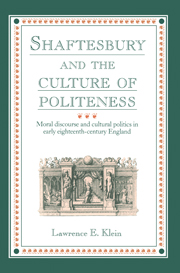 Shaftesbury and the Culture of Politeness
Shaftesbury and the Culture of Politeness Book contents
- Frontmatter
- Contents
- Acknowledgments
- Bibliographical note
- Introduction
- Part I Polite Philosophy
- 1 The amalgamation of philosophy and breeding
- 2 Lord Ashley's Inquiry. The philosophy of sociability and its context
- 3 The notebooks: the problem of the self
- 4 The notebooks: philosophy in the inner life
- 5 Philosophy in society
- 6 Philosophical writing
- Part II Polite Whiggism
- Index
1 - The amalgamation of philosophy and breeding
Published online by Cambridge University Press: 13 March 2010
- Frontmatter
- Contents
- Acknowledgments
- Bibliographical note
- Introduction
- Part I Polite Philosophy
- 1 The amalgamation of philosophy and breeding
- 2 Lord Ashley's Inquiry. The philosophy of sociability and its context
- 3 The notebooks: the problem of the self
- 4 The notebooks: philosophy in the inner life
- 5 Philosophy in society
- 6 Philosophical writing
- Part II Polite Whiggism
- Index
Summary
A philosophical vocation
As a young man, the third earl of Shaftesbury already recognized his antagonism to current trends in philosophy. In 1694, at the age of twenty-three, he wrote to John Locke:
It is not with mee as with an Empirick, one that is studdying of Curiositys, raising of new Inventions that are to gain credit to the author, starting of new Notions that are to amuse the World and serve them for Diverting or for tryall of their Acuteness … Descartes, or Mr Hobbs, or any of their Improvers have the same reason to make a-doe, and bee Jealouse about their notion's and DISCOVERY'S, as they call them; as a practizing Apothecary or a mountebank has to bee Jealouse about the Compositions that are to goe by his name … for my part: I am so far from thinking that mankind need any new Discoverys … the thing that I would ask of God should bee to make men live up to what they know; and that they might bee so wise as to desire to know no other things then what belong'd to em, and what lay plain before them … What I count True Learning, and all wee can profitt by, is to know our selves … whilst Such are Philosophers and Such Philosophy whence I can Learn ought from, of this kind; there is no Labour, no Studdy, no Learning that I would not undertake.
In distinguishing two conceptions of philosophy, the letter adumbrated Shaftesbury's mature thinking.
- Type
- Chapter
- Information
- Shaftesbury and the Culture of PolitenessMoral Discourse and Cultural Politics in Early Eighteenth-Century England, pp. 27 - 47Publisher: Cambridge University PressPrint publication year: 1994


